Brandon Stanton's Blog, page 162
September 1, 2016
“I’m going to first grade. We’re gonna do...

“I’m going to first grade. We’re gonna do hard stuff.”
August 31, 2016
(5/5) “I tried to make it as comfortable as possible for him. ...
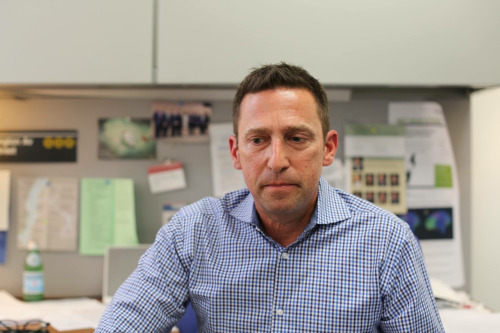
(5/5) “I tried to make it as comfortable as possible for him. We tried everything. We went to every trial and appointment. Larry really thought he was going to make it. And I encouraged him as much as I could. Even when he went blind. Even when I had to carry him to the bathroom. We still thought he was going to make it. We were always moving forward. Then one night we were lying in bed. And I knew it was over. He was covered in ulcers, and dehydrated, and emaciated. And I told him that I loved him, and that we’d get through this, but at that moment I knew it was over. Five days later he stopped breathing. I never talked about Larry in our support groups, but my patients somehow found out what happened and a bunch of them came to the funeral. So this is has always been more than professional to me. I know about trauma. And I know the treatment works. Because I’ve been through it.”
———————————————————–
Gerard Ilaria is the head clinician at Headstrong Project. He has provided one-on-one treatment for most of the veterans featured in this series. Many of those veterans credit him with saving their life. For the rest of the day, we are holding a fundraiser to help Gerard and Headstrong in their mission to heal veterans with PTSD. The organization’s budget last year was only $750,000. We’ve raised over half that so far. A small donation will go a long way, so please consider donating: http://bit.ly/2bQe8cR
(4/5) “This works feels very familiar. I ran an AIDS program for...
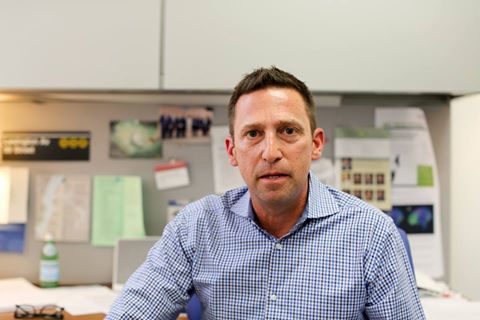
(4/5) “This works feels very familiar. I ran an AIDS program for twenty years before I started working with veterans. Both jobs involve a highly stigmatized diagnosis. And both involve counseling people who have had a horrible, unexpected experience. I began working with AIDS during the 1980s. It seemed like we were losing an entire generation of gay men. We had no fucking idea what was happening. It was terrifying. The moment I shook a new client’s hand, I’d steel myself for his death. My clients never lived more than two years and I had 125 at a time. I tried to reassure them as much as I could. I tried to help them with their shame. But mainly I just tried to manage their terror. Our support groups could be gruesome. Participants would come in with IV poles and we were losing people every single week. Group members could look around the room and see the specter of their own future. It was horrifying. But they came anyway. They came every week because it was better than facing it alone. This work has always been more than professional to me. Because after work every single night, I’d go home to my partner, and care for him. Because he was dying too.”
—————————————————————–
Gerard Ilaria is the head clinician at Headstrong Project. He has provided one-on-one treatment for most of the veterans featured in this series. Many of those veterans credit him with saving their life. For the rest of the day, we are holding a fundraiser to help Gerard and Headstrong in their mission to heal veterans with PTSD. The organization’s budget last year was only $750,000. We’ve raised nearly half that so far. A small donation will go a long way, so please consider donating: http://bit.ly/2bQe8cR
(3/5) “Trauma causes the brain to malfunction. During a...
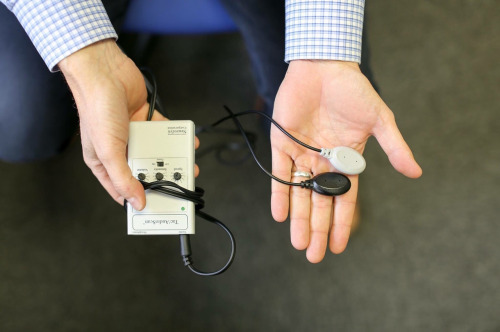
(3/5) “Trauma causes the brain to malfunction. During a traumatic experience, memories cannot be processed correctly. So a person with PTSD is still carrying those traumatic experiences around in their body. Because those experiences were never filed away into the ‘past tense,’ the brain continues to operate as if the trauma is happening in the ‘present tense.’ It’s like a computer with a program that’s running constantly in the background. The idle is way too high. And it’s an exhausting way to live. So those memories need to be revisited and processed. And we have an amazing way of doing that. It’s called EMDR. I won’t explain it here, but it works. It takes away symptoms. It won’t turn you into a yogi who sits on the beach. But it will take away panic attacks. It will take away insomnia. And it will take away suicidal idealizations. We aren’t changing anyone. But we are getting people back to their best self.”
———————————————————
Gerard Ilaria is the head clinician at Headstrong Project. He has provided one-on-one treatment for most of the veterans featured in this series. Many of those veterans credit him with saving their life. For the rest of the day, we are holding a fundraiser to help Gerard and Headstrong in their mission to heal veterans with PTSD. The organization’s budget last year was only $750,000, so a small donation can go a long way. Together we can significantly magnify Gerard’s impact: http://bit.ly/2bQe8cR
(2/5) “PTSD results from an overactive sympathetic nervous...
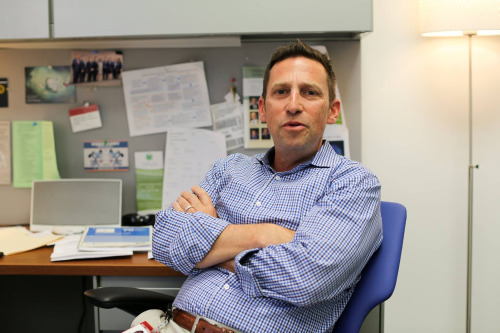
(2/5) “PTSD results from an overactive sympathetic nervous system. It’s the same part of the brain that kept our ancestors alive when lions jumped out of the bushes. It’s ‘fight or flight.’ If a soldier’s mind stays in that mode for too long, it doesn’t always come back. Everyone expects veterans to return to normal when they come back home. The kids are so excited that Daddy’s back. Their spouse wants them to get a good job, and join the rotary, and save for a bigger house. But it’s only the veteran’s body that has returned to safety. Their nervous system is still living in a dangerous place. PTSD creates the feeling that something terrible is always around the corner. It can cause anxiety, confusion, and isolation from loved ones. But worst of all, it can make it seem like things will never get better. Most of my clients report a sense of foreshortened future. And that’s the first symptom I treat. Because the stakes could not be higher. Everything else can wait. First and foremost, we’re a suicide prevention program.”
———————————————————
Gerard Ilaria is the head clinician at Headstrong Project. He has provided one-on-one treatment for most of the veterans featured in this series. Many of those veterans credit him with saving their life. For the rest of the day, we are holding a fundraiser to help Gerard and Headstrong in their mission to heal veterans with PTSD. The organization’s budget last year was only $750,000, so small donations will go a long way. Together we can significantly magnify Gerard’s impact: http://bit.ly/2bQe8cR
(1/5) “I understand that it’s not sexy to talk about...
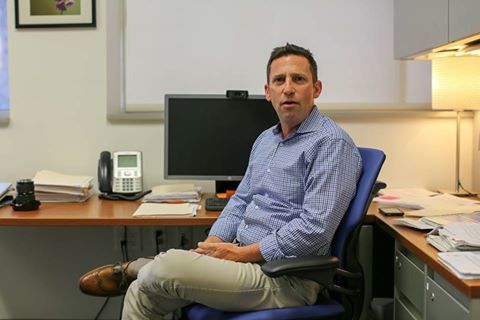
(1/5) “I understand that it’s not sexy to talk about treatment. But the maddening thing about PTSD is that it’s completely fucking fixable. The narrative about it has got to change. PTSD is not Uncle Joe from Vietnam. It’s not homelessness. It’s not a heroin addiction. It’s not the end of the world and it’s certainly not suicide. PTSD is an anxiety disorder and we can treat it. But you’ve got to get help. In the military, you hear things like ‘shake it off’ or ‘rub dirt on it.’ And those are great messages for people at war. But you’re home now. You’re back with your families and the warrior mindset is no longer appropriate. If your nervous system is broken, it needs to be fixed. Just like a broken leg needs to be fixed. It’s that simple. You may have served with guys who don’t have issues– that’s great for them. But that doesn’t mean they are stronger than you. It means they don’t have the same nervous system as you. It’s not weakness. It’s science. And it can be solved.”
———————————————————
Gerard Ilaria is the head clinician at Headstrong Project. He has provided one-on-one treatment for most of the veterans featured in this series. Many of those veterans credit him with saving their life. Gerard often speaks out passionately against the ‘warrior culture’ of the military. He believes that an overemphasis on ‘toughness’ and ‘not needing help’ contributes to the stigmatization of PTSD. He believes this stigma keeps veterans from getting the help they need. For the rest of the day, we are holding a fundraiser to help Gerard and Headstrong in their mission to heal veterans with PTSD. The organization’s budget last year was only $750,000, so a small donation will go a long way. Together we can significantly magnify Gerard’s impact: http://bit.ly/2bQe8cR
August 30, 2016
“I went out for beers one night with my battalion commander,...
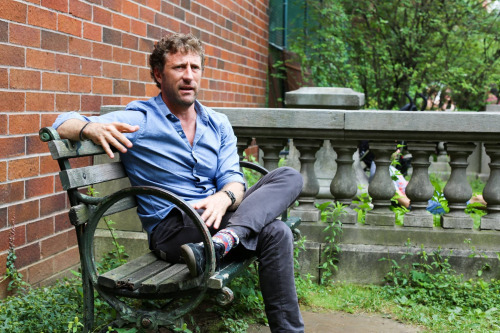
“I went out for beers one night with my battalion commander, Colonel Willy Buhl. He really cared about us. He was one of those leaders who’d remember the name and birthday of every man in his battalion. So we’re sitting at the bar one night, and we’re talking about all the men we’d lost to suicide. A number of Marines from our battalion had killed themselves since we’d been home. And there had been an especially bad one recently. One of our guys had shot himself with his wife and kids downstairs. Colonel Buhl and I realized that there’d soon be a point in time when we’d lost more Marines to suicide than to enemy action. And I knew we had to do something. It’s an epidemic. Every veteran knows another veteran who’s taken their own life. We have to do better. So I approached a top psychiatrist and public health expert named Dr. Ann Beeder, and I asked her a question: Can we take all the friction out of the process of getting help? The Headstrong Project was our answer to that question. We wanted to create a treatment option with zero cost and zero bureaucracy, so that a veteran’s only challenge was showing up. All they have to do is overcome the stigma of PTSD.”
———————————————
Zach Iscol is the founder of Headstrong Project, which partnered with HONY to tell the stories of veterans suffering from invisible wounds. Tomorrow is the last day of the series and will focus on treatment. Headstrong has already provided treatment to hundreds of veterans, and has ambitious plans to remodel our approach to the treatment of trauma. But the organization is just a few years old and operates with very limited resources. Last year’s entire budget was around $750,000. If you’ve been moved by any of these stories, we’re holding a fundraiser to help Headstrong Project in its fight against PTSD. We could make a very significant impact if we raise $100,000. Please consider empowering Zach’s efforts with a small donation:http://bit.ly/2bQe8cR
“I went out for beers one night with my battalion...

“I went out for beers one night with my battalion commander– Colonel Willy Buhl. He really cared about us. He was one of those leaders who’d remember the name and birthday of every man in his battalion. So we’re sitting at the bar one night, and we’re talking about all the men we’d lost to suicide. A number of Marines from our battalion had killed themselves since we’d been home. And there had been an especially bad one recently. One of our guys had shot himself with his wife and kids downstairs. Colonel Buhl and I realized that there’d soon be a point in time when we’d lost more Marines to suicide than to enemy action. And I knew we had to do something. It’s an epidemic. Every veteran knows another veteran who’s taken their own life. We have to do better. So I approached a top psychiatrist and public health expert named Dr. Ann Beeder, and I asked her a question: Can we take all the friction out of the process of getting help? The Headstrong Project was our answer to that question. We wanted to create a treatment option with zero cost and zero bureaucracy, so that a veteran’s only challenge was showing up. All they have to do is overcome the stigma of PTSD.”
———————————————
Zach Iscol is the founder of Headstrong Project, which partnered with HONY to tell the stories of veterans suffering from invisible wounds. Tomorrow is the last day of the series and will focus on treatment. Headstrong has already provided treatment to hundreds of veterans, and has ambitious plans to remodel our approach to the treatment of trauma. But the organization is just a few years old and operates with very limited resources. Last year’s entire budget was around $750,000. If you’ve been moved by any of these stories, we’re holding a fundraiser to help Headstrong Project in its fight against PTSD. We could make a very significant impact if we raise $100,000. Please consider empowering Zach’s efforts with a small donation:http://bit.ly/2bQe8cR
August 29, 2016
“The military is mostly filled with people who genuinely...
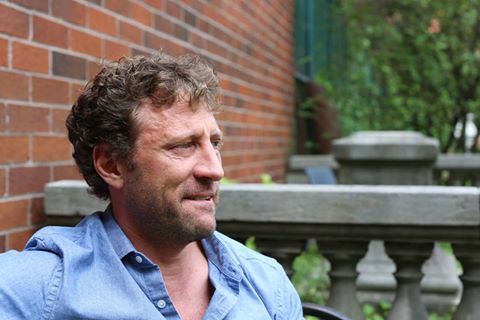
“The military is mostly filled with people who genuinely desire to do the right thing. More Marines receive the Medal of Honor for jumping on grenades than any other action. It’s a culture where officers eat last and everyone shares their water. These people grew up as boy scouts and girl scouts. The whole reason they volunteered was because they wanted to do the right thing. But the right thing is never clear in war. If you shoot too early, an innocent person gets killed. If you shoot too late, you lose a buddy. So a lot of our injuries are moral ones. Most of us come home feeling like we did something wrong. Or we didn’t give enough. Or that our friends gave too much. My best friend in the Marines was a guy named Ronnie Winchester. He was the nicest guy you can imagine. My 22nd birthday was during our officer training course. None of us had slept. We were all starving. We were only getting one ration per day. But Ronnie wanted to give me a memorable birthday. So he put a candle in his brownie and gave it to me. That’s how nice of a guy he was. Ronnie ended up getting killed in Iraq. And if a guy like Ronnie got killed, you can’t help but wonder why you deserve to be alive. Ronnie was 25 years old when he died. He is always going to be 25 years old. I have a wife and kids now. I get to grow old. But Ronnie Winchester is always going to be 25.”
August 28, 2016
(6/6) “We like to say that God has a plan, but we just didn’t...
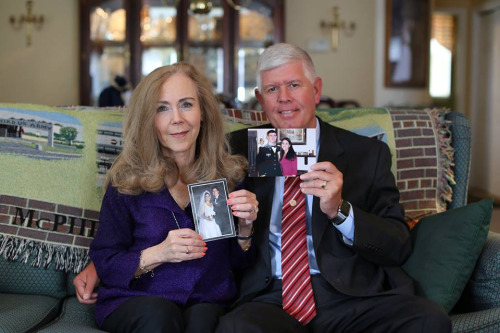
(6/6) “We like to say that God has a plan, but we just didn’t get to have a say in it. After the boys died, we dedicated our lives to encouraging young people to get help with depression. So many soldiers are afraid to seek help. They’re afraid to tell the Army. They’re afraid of what their fellow soldiers will think. We want them to know that it’s no different than asking for help with a broken arm. After the boys died, we never thought we’d be happy again. Carol felt suicidal herself. I felt guilty for even laughing. But happiness returned slowly. Our daughter Melanie is doing great. She’s a runner, and a swimmer, and a nurse. I ended up getting promoted to general on September 22nd—Jeffrey’s birthday. My boss engraved my sons’ names on each star. During the ceremony, while he was pinning the stars on my shoulders, he told me: ‘Kevin and Jeffrey will always be with you.’ When I became a general, I was allowed to select an aide. I interviewed eight people for the position. I chose a fantastic young man named Joe Quinn. And Joe is now my son-in-law. He ended up falling in love with Melanie, they got married, and we’re expecting our first grandchild in a month. We are just giddy about that. So ‘happy now’ is different than ‘happy then,’ but we do feel happiness again. ‘Happy now’ is Melanie and Joe. ‘Happy now’ is our future grandchild. And ‘happy now’ is a young soldier who hears Kevin’s story, and tells us that they got help.”
Brandon Stanton's Blog
- Brandon Stanton's profile
- 769 followers



